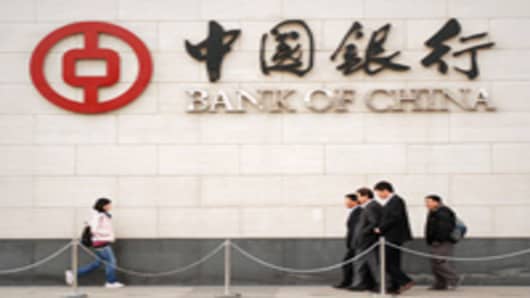The red-hot profit growth enjoyed by Chinese banks in recent years will slow sharply in the first quarter of 2012, industry experts tell CNBC. But, they add, mainland lenders remain an attractive investment opportunity given their cheap valuations.
“We expect earnings growth for the whole sector to decrease to 17 percent year on year from 38 percent in the first quarter 2011,” Simon Ho, Head of Asian Financial Research at Citigroup told CNBC.
“It’s not really a worry, it’s in line with expectations – we expect to see 15 percent growth for the overall sector for full-year 2012,” Ho added. Hong Kong-listed Chinese banks have averaged 30 percent earnings growth per year since 2005.
Jiang Jianqing, Chairman of the country’s biggest lender Industrial and Commercial Bank of China (ICBC), which is due to report earnings on Friday, says a slowdown in profit growth will be a trend for the sector.
“Just as it impossible for China’s economy to continue a growth rate of over 9 percent for the next 30 years, Chinese banks will witness their profit growth gradually coming down to a reasonable level starting from this year,” Jiang told CNBC’s “Managing Asia”.
According to Ho, the key factor behind the deceleration in earnings growth is that net interest margins — the difference between the interest earned by banks and the interest paid on deposits — have come under pressure because of extra liquidity in the system.
“Net interest margins are likely to decline slightly quarter-on-quarter across the board,” he said. “Last year, loan pricing went up because China was going through a credit tightening cycle. But, this year, as the government eases liquidity there will be erosion in the loan pricing power of banks. Also there is less demand for loans because the economy is slowing down.”
Jim Antos, banking analyst at Mizuho Securities agrees that the flattening of the banks’ net interest margins is to blame for slower earnings growth.
"The trend of net interest margins is the most important factor for Chinese banks. This year, we won’t have a significant widening of the net interest margins, like we saw in 2011,” he said. “They (banks) have charged their maximum prices for loans, especially for all their small business customers…there is no more room for increasing the pricing.”
In 2011, approximately 80 percent of the operating income of China’s five major state-owned commercial banks - ICBC, the Agricultural Bank of China, Bank of China, China Construction Bank and Bank of Communications - came from net interest income, or the revenue generated from their loans, according to industry estimates.
In addition, Hong Kong-based analyst Michael Werner, senior banks analyst at Sanford C Bernstein says moderating fee income growth will also add to the slowdown in earnings.
Growth in fee income has declined after China’s National Development and Reform Commission placed restrictions on the fees banks could charge to retail investors, government projects and to small-and-medium sized enterprises (SMEs), Werner said.
Werner forecasts fee income growth will decelerate from 15 percent year-on-year in the fourth quarter of 2011, to just 1 percent in the first quarter.
Bank Stocks Still a Buy
Despite the profit slowdown, analysts believe Chinese banking stocks remain a good buying opportunity based on their attractive valuations and expectations of a turnaround for the economy.
“The economy may bottom in second quarter, and we do foresee incrementally more loosening measures to support the economy. We also see loosening up on the property side as well,” said Ho, whose top pick is ICBC.
“ICBC is the largest bank they have the highest amounts of capital, strong balance sheet and are well provisioned. It has the highest profitability out of all the banks on an ROE (return on equity) basis,” he said.
His 12-month price target for the company, which is trading at a forward price-to-earnings (P/E) ratio of 6.3, is HK$6.50 ($0.83) – a 27 percent upside from current levels.
Werner agrees that valuations look compelling. He recommends both ICBC and China Construction Bank (CCB). However, he says of the two, CCB is more attractive, given the risk of Goldman Sachs selling down its stake in ICBC, putting pressure on its stock.
His target price for CCB, which is trading at a forward P/E ratio of 6.3 times, is HK$8.60 ($1.10) – a 45 percent upside from current levels.



